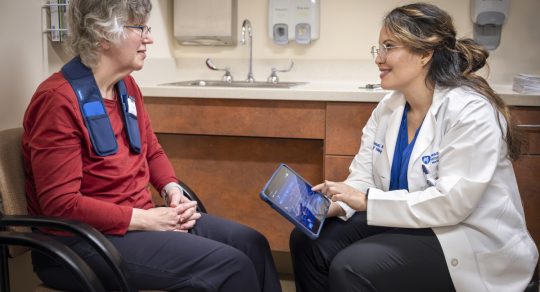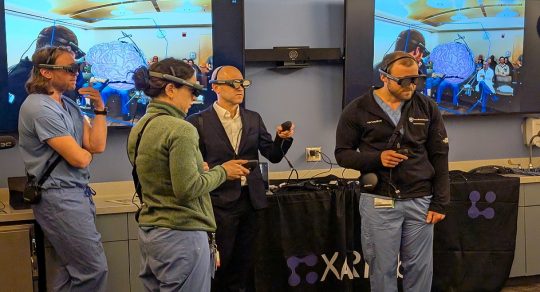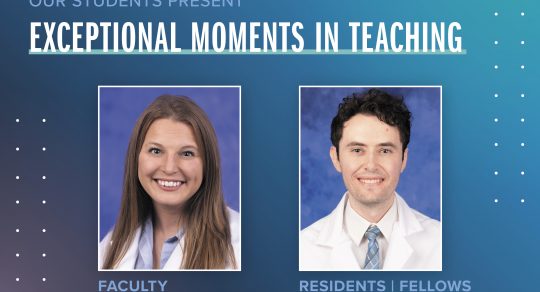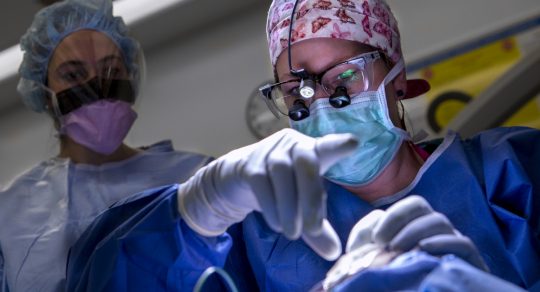Residency
Neurosurgery
The Neurosurgery Residency at Penn State Health Milton S. Hershey Medical Center is a seven-year, ACGME-accredited program that admits three residents per year.
On This Page
A collegial, collaborative and supportive environment exists among the faculty, residents, nurses and staff of Penn State Neurosurgery. More than 20 full-time clinical faculty members in the Department of Neurosurgery perform about 4,900 neurosurgical procedures per year, including endovascular and radiosurgical cases. Neurosurgery residents at Penn State Health Milton S. Hershey Medical Center receive excellent clinical training in all areas of neurosurgery, including endovascular and vascular neurosurgery, epilepsy surgery, functional neurosurgery, neuro-oncology and skull base surgery, neurocritical care, neurotrauma, pediatric neurosurgery, peripheral nerve surgery, radiosurgery and spine surgery, under the direction of nationally recognized and fellowship-trained neurosurgery faculty members.

Program Overview
The department also offers six fellowships (endovascular, functional, neurocritical care, neuro-oncology, peripheral nerve, and spine), the majority of which are accredited by the Society of Neurological Surgeons’ Committee for Advanced Subspecialty Training (CAST). Residents finish their training fully equipped to enter the neurosurgical practice of their choice. They are well-trained in the preoperative, operative, and postoperative care of all neurosurgical patients, with an excellent understanding of basic, translational, and clinical neuroscience.
Learn More about the Residency
The Neurosurgery Residency Program’s mission is to train neurosurgery residents in the profession of neurosurgery, providing for them an educational, clinical, operative, and research environment of the highest standard.
To this end the Penn State Neurosurgery Residency will:
Train neurosurgery residents in the profession of neurosurgery, providing for them an educational, clinical, operative and research environment of the highest standard.
Prepare trainees for the neurosurgical career of their choice.
Enable trainees to successfully compete for the professional opportunities of their choosing, including those of academia.
Foster an appreciation among residents and staff for the scholarly values and societal ideals that are the underpinnings of the profession.
Promote a responsible, productive and healthy work ethic recognizing the needs of both society and the individual.
Further the knowledge of basic and clinical neuroscience through neurosurgical research.
Be active members in the regional, national and international neurosurgical community.
Participate in the broader academic programs of Penn State College of Medicine, Penn State Health Milton S. Hershey Medical Center and Penn State for the benefit of undergraduate, medical and graduate students as well as colleagues and self.
Ensure that both Penn State Neurosurgery's goals and its individuals' needs can be met in a working environment that is collegial, collaborative, facilitative, fair and personally rewarding.
The Neurosurgery Residency participates in the National Residency Matching Program (NRMP) and matches three residents per year as a categorical training program.
Concurrent with participating in the NRMP, neurological surgery programs use the Electronic Residency Application Service (ERAS). Applications are taken through ERAS only. All applications are considered without regard to race, religion, gender or national origin.
Steps for a Successful Match
Register with the National Resident Matching Program (NRMP). All first-year residency positions are filled through the NRMP.
Register with the Electronic Residency Application Service (ERAS). All applicants to the residency program must come through ERAS.
Application deadline:
Due to the volume of applications received and the time constraints of individual interviews, applications received after Oct. 1 may not be considered.
A completed application is required for review.
Application Requirements
The following items must be included in the ERAS application:
Personal statement
Curriculum vitae
Letters of recommendation: At least three letters of recommendation from faculty members with whom the applicant has worked, and at least one from a neurosurgeon. The program will not review more than four letters of recommendation and does not require a letter from the applicant’s department chair.
Dean’s letter
Medical school transcripts
For international medical graduate students, ECFMG certification is required as a part of the application. Penn State Health only accepts/sponsors J-1 visas.
USMLE Step 1 and Step 2 CK is required to be selected for an interview.
Program Signals
Per the American Medical Association (AMA), program signaling is a system that allows applicants to indicate interest in a limited number of residency programs. Because the applicants are given a limited number of signals, they should be given to programs in which they believe they are most interested. Residency Programs receiving the signals in turn utilize it as one of many data points when considering who they will invite to interview.
Non-U.S. Citizens
Applicants who are not U.S. citizens are responsible for obtaining a visa that permits direct patient care. Employment is contingent upon evidence of the appropriate visa and permission to work in the United States presented to a medical center official. The program accepts only J-1 training visas for non-U.S. citizens who are entering an ACGME training program.
Foreign Medical Graduates
All graduates of international medical schools must hold a valid certificate issued by the Educational Commission for Foreign Medical Graduates (ECFMG) to be appointed as a resident or fellow. For details, contact ECFMG at info@ecfmg.org or ECFMG, 3624 Market St., Philadelphia PA 19104-2685, USA.
For international medical graduates, U.S. clinical experience is strongly recommended including neurosurgery electives and/or other clinical experiences.
Interviews
Interviews are by invitation only. Once the program reviews completed ERAS files, qualified applicants will be invited for an interview with faculty, residents, and other key members of the neurosurgery team. It is advisable to respond to the invitation for an interview as quickly as possible since interview dates fill up quickly.
Travel and Lodging
The program does not pay for candidate travel or lodging but will share travel tips and any discounts available to candidates.
Leadership


Program Coordinator, Neurosurgery Residency
Supporting Your Training
Curriculum Details
The Accreditation Council for Graduate Medical Education and the Neurosurgery Residency Review Committee have provided core curriculum and core competency standards that must be met at each stage of the neurosurgical residency.
Each resident is expected to meet these standards on the appropriate schedule; faculty evaluations will include an assessment of each resident’s progress toward these goals.
In response to this ACGME requirement for competency in these areas, all residents are expected to participate in core competency training as defined by the program.
All required clinical rotations occur on Penn State Health’s campus in Hershey, Pa. Penn State Health Milton S. Hershey Medical Center, Penn State Health Children’s Hospital, the East Campus Neuroscience Clinic and Hershey Outpatient Surgery Center are all on campus. Elective rotations can be done elsewhere in central Pennsylvania, with a typical four-month elective at Penn State Health Holy Spirit Medical Center, a nearby 300-bed community hospital, occurring in the PGY-3 year.
One resident per year has the opportunity to serve as a registrar at the Sir Charles Gairdner Hospital in Perth, Australia, if they desire. Other, shorter rotations abroad at a variety of locations can also be arranged.
The clinical component of the Neurosurgery Residency is organized around three distinct services within Penn State Health: two adult neurological services and a pediatric neurological service.
The Harbaugh Service aka Red Service has an emphasis on neurocritical care, neurosurgical trauma, cerebrovascular surgery, and endovascular neurosurgery.
The Page Service aka Blue Service has an emphasis on skull base surgery, neuro-oncology, complex spine surgery, peripheral nerve surgery, and stereotactic and functional neurosurgery.
The Johnson Service aka Pink Service has an emphasis on pediatric neurosurgery and electives.
Structured rotations on each of these services provide training in all areas of neurosurgical care.
The Neurosurgery Residency is flexible enough to accommodate each trainee’s individual educational needs and interests. Residents are advanced to higher levels of responsibility based on performance evaluations. Elective rotations are scheduled throughout the program, and the use of elective time is determined based on the resident’s interests and experience. Elective time may be spent studying a subspecialty of neurosurgery or performing research.
History Behind the Service Line Names
Red Service: Harbaugh Service was named in honor of Dr. Robert E. Harbaugh, the first Chair of the Department of Neurosurgery at Penn State College of Medicine.
Dr. Harbaugh graduated from Penn State College of Medicine in 1978. He then went on to complete his neurosurgery residency at Dartmouth-Hitchcock Medical Center. After spending much of his career leading the cerebrovascular disease program at Dartmouth, he was appointed the inaugural chair of the Penn State Department of Neurosurgery in 2003. Dr. Harbaugh is internationally known for his work on cerebrovascular disease, in particular awake carotid endarterectomy. He was one of the early pioneers of neurosurgical involvement in neuro-critical care and was a founding member of the Neurocritical Care Society. Dr. Harbaugh has held numerous leadership roles in organized neurosurgery, including serving as Chair of the Joint Cerebrovascular Section of the American Association of Neurological Surgeons (AANS) and Congress of Neurological Surgeons (CNS), President of the AANS, President of the Society of Neurological Surgeons, and Chair of the Neurosurgery Residency Review Committee (RRC) of the Accreditation Council for Graduate Medical Education (ACGME). In 2018 Dr. Harbaugh was appointed Senior Vice President for Academic Practices at Penn State Health. In 2021, he stepped aside as neurosurgery department chair to concentrate on his growing health system role, a role he continues to focus on today.
Blue Service: Page Service was named for Dr. Robert B. Page, one of the original faculty members of the Division of Neurosurgery and the last chief of the division before neurosurgery became its own department.
Dr. Page received his MD from Columbia University’s College of Physicians and Surgeons in 1963. He began his surgical internship in 1963 with the First (Columbia) Surgical Division at Bellevue Hospital in New York City and completed his first year of surgical residency there in 1965. After two years of service in the United States Navy, Dr. Page trained in neurosurgery at Yale New Haven Hospital from 1967 to 1972. In 1972, he joined the surgical faculty in the Division of Neurosurgery at the then new medical school of the Pennsylvania State University at the Milton S. Hershey Medical Center as an Assistant Professor. Dr. Page’s NIH funded research focused on the anatomy of the pituitary gland’s microvasculature and the regulation of blood flow within the gland. Dr. Page was elected a Faculty Scholar at the Pennsylvania State University in 1985. He was a delegate to the Council of State Neurosurgical Societies and a member of the Board of Directors of the American Association of Neurological Surgeons and the Pennsylvania Trauma Systems Foundation. He was President of the Pennsylvania Neurosurgical Society from 1990-1991. Dr. Page retired in 2004 and after spending a few years in rural Maine, he now lives in Camp Hill, Pennsylvania.
Pink Service: Johnson Service was named after Dr. Dennis L. Johnson, the first pediatric neurosurgeon at Penn State Health Milton S. Hershey Medical Center.
Dr. Johnson went to medical school at the University of California – Irvine and did his neurosurgical residency at the University of Virginia and Brigham & Women’s Hospital in Boston. He completed a fellowship in Pediatric Neurosurgery at Boston Children’s Hospital. Dr. Johnson joined the faculty at Penn State College of Medicine at Hershey Medical Center in 1992 as the institution’s first pediatric neurosurgeon. Known for his often colorful descriptions of the children he took care of Dr. Johnson was a highly regarded expert on pediatric traumatic and non-traumatic brain injury. Soon after receiving a heart transplant for viral cardiomyopathy in 1997, Dr. Johnson gradually transitioned away from the practice of pediatric neurosurgery. In 2000, he transferred to the Department of Medicine where he founded the Palliative Care Program. He dedicated the remainder of his career to advancing the, at the time, relatively new field of palliative care medicine. Dr. Johnson left Penn State for his former alma mater, the University of Virginia in 2011. He passed away in 2015.
Harbaugh (Red Service) Rotations cover the neurocritical care unit, trauma, and vascular service lines.
Page (Blue Service) Rotations covers the spine, functional & stereotactic, epilepsy, peripheral nerve, and neurosurgical oncology, and skull base service lines.
Johnson (Pink Service) Rotations cover the Pediatrics service as well as neuroradiology, neuropathology, and "other specialty" electives.
PSHSMC Elective provides a mix of neurosurgery outpatient services, as well as complex spine and skull base surgeries at our affiliate hospital.
The Neurosurgery Residency offers fellowships in the following subspecialties. These fellowships are currently offered as enfolded experiences to trainees in the Neurosurgery Residency.
CNS Endovascular Neurosurgery Fellowship (CAST Accredited): Scott Simon, MD, FAANS, Fellowship Director
Neurocritical Care Fellowship (CAST Accredited): J. Christopher Zacko, MD, Fellowship Director
Peripheral Nerve Neurosurgery Fellowship (CAST Accredited): J Christopher Zacko, MD, Interim Fellowship Director
Spinal Neurosurgery Fellowship (CAST Accredited): G. Timothy Reiter, MD, Fellowship Director
Stereotactic and Functional Neurosurgery Fellowship (CAST Accredited): James McInerney, MD, FAANS, FACS, Fellowship Director
The department also offers unaccredited focused specialty training in the following areas:
Cerebrovascular Microsurgery
Peripheral Nerve Surgery
In addition to exceptional clinical training, neurosurgery residents have access to a robust neuroscience research program in neurosurgery. Eight full-time research faculty members have ongoing programs in a wide range of areas, including neural engineering, a joint program between Penn State Neurosurgery and the Department of Engineering Science and Mechanics, at Penn State University’s main campus. Penn State Neurosurgery has more than $8,000,000 in active grants and ranks among the highest neurosurgery departments in NIH funding nationwide.
The department also supports a vigorous clinical research program with a well-developed clinical trials group. More than 40 investigator-initiated or industry-sponsored clinical studies are underway.
Residents are required to participate in a research activity during their residency, and time has been set aside during the rotations for this pursuit. An independent study year can be used for research in an area of the resident’s choice, and additional research time is available throughout the training.
The department has a wealth of opportunities in basic, translational and clinical research in all areas of neurosurgery. In addition, there are strong collaborations with researchers in other Penn State departments both in the College of Medicine and the broader University.
Residents are expected to use their research time wisely to work with a faculty mentor within the department, within the institution, or outside of the institution with prior approval. Residents should plan their research time during the year preceding their actual research year to make optimum use of their time.
Residents should discuss their plans with the program director and the appropriate faculty members in advance and obtain approval for their research projects. The resident is responsible for contacting an appropriate faculty mentor and setting up a research program consistent with their area of interest and experience. Each resident is expected to create a manuscript for publication on basic, translational, or clinical research each year from PGY-2 to PGY-7.
Those residents who choose to do an enfolded fellowship during their independent study year are expected to make research a meaningful part of the fellowship experience.
The Department of Neurosurgery works closely with the following labs:
Penn State Neurosurgery takes the resident education mission very seriously. Each Friday is devoted to resident teaching conferences from 7 a.m. to 4 p.m.
Additional conferences occur on Thursday mornings before operations begin.
The conference schedule is meant to expose residents to all disciplines of basic and clinical neuroscience. Participation in multidisciplinary conferences with other specialties within the institution contributes to a sound educational experience for the residents.
Extensive training in biostatistics and clinical trial design is included as a routine part of every resident’s education.
Fellow Honors and Recognitions
Penn State College of Medicine and Penn State Health Milton S. Hershey Medical Center accept ongoing nominations for the Exceptional Moments in Teaching award.
The award, given monthly by the Office for a Respectful Learning Environment, accepts nominations from College of Medicine students who are invited to submit narratives about faculty members, residents, fellows, nurses or any other educators who challenge them and provide an exceptional learning experience. See more about the award here.
Previous nominees from the Neurosurgery Residency are listed here.
The annual Resident/Fellow Research Day is held each year (with exception of during the COVID-19 pandemic) on and around the Penn State Health Milton S. Hershey Medical Center campus.
The intent of the event is to provide an opportunity for residents and fellows to showcase their research accomplishments to their peers in other clinical departments, as well as their colleagues in the basic sciences.
Learn more about Resident/Fellow Research Day here.
Previous presentations from the Neurosurgery Residency are listed here.



